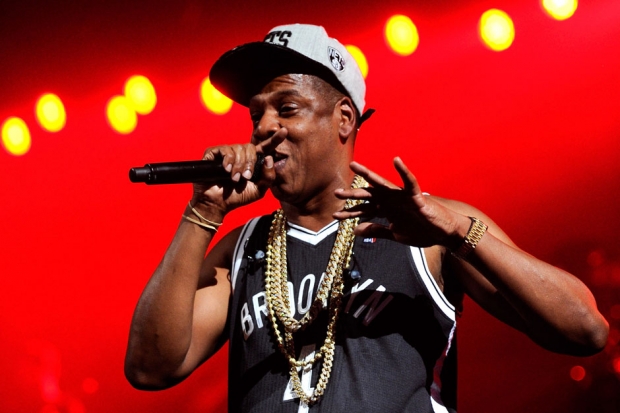Release Date: July 04, 2013
Label: Roc-A-Fella/Roc Nation/Universal
Given its proximity to Kanye West’s critically beloved My Beautiful Dark Twisted Fantasy and the maximalist sound the two albums share, the joint 2011 project Watch the Throne has always been considered more Kanye’s album than Jay-Z’s. Likewise, Yeezy idolizers will forever contend that the album’s success came from Hov hitching his G-Wagon to rap’s greatest-ever artiste, which, it should be noted, is wrong. After the wandering bluster of his last solo album, 2009’s Blueprint 3, the far superior Throne found Jay carving a new path, contemplative and lucid about his position as one of the most successful and visible black men in America, taking stock of his life, his career, and his family after years of indulging a willingness to coast on his own reputation.
Now, with his 12th solo album, Magna Carta Holy Grail, he’s carved yet another path — though this one, of course, has little to do with the music. In initially releasing the album exclusively through an app on Samsung phones — and receiving seven figures up front to do so — Jay-Z has laid down the trump card in a year filled with superstar musicians releasing surprise albums with elaborate promotional rollouts. Thanks to the album’s ubiquitous, deceptive Rick-Rubin-on-a-couch promo and Jay’s crowing about creating #newrules, it’s hard to view this piece of music — this art — through any prism besides the business one. The songs themselves — overwrought yet somehow still undercooked — don’t do much to shift the perspective, either. This is a businessman making a business deal, with listeners simply left to handle the moving parts.
That could be, I guess, a description of any album released through a major label — but rarely has music of this visibility felt so much like an afterthought without having been literally contractual. Magna Carta Holy Grail was made overwhelmingly by musical legends: Timbaland, Pharrell, Justin Timberlake, Nas, Beyoncé. In teaming up with Samsung, Jay wanted the world to marvel at his power; in teaming up with this roster of collaborators, he makes it clear that’s all this album is about. What exactly comes of this team-up between corporation and rapper is inconsequential. That it simply exists — that it gets people talking about Jay-Z and Samsung — is enough.
Of course, Jay has always made music so the masses would marvel. But this was once achieved through his skill as a rapper. He was the best MC since Biggie — he knew it, he knew that you knew it, and so he said it. But on MCHG, we’re simply supposed to marvel at Jay’s things. He spends much of the album just throwing out the names of artists and luxury brands like confetti. On “Picasso Baby”: “It ain’t hard to tell / I’m the new Jean Michel / Surrounded by Warhols / My whole team ball / Twin Bugattis outside the Art Basel / I just wanna live life colossal.” On “BBC”: “Versace plates got the Basquiat / Collab from the Versace place.” This is rap written around references in a way that barely makes sense. Riff Raff does this, too, but it’s supposed to be absurd instead of important.
This — Jay sloppily celebrating his extreme wealth and the taste it has bought him — isn’t offensive, or particularly new. Watch the Throne had plenty of that: As he said himself, if you escaped what he escaped, you’d be in Paris bragging about your Basquiats, too. But here, in this form at least, it’s just lazy. On the chorus of “Tom Ford” — which features a dinky, metallic Timbaland beat like a Pavlovian exercise — he spouts, “I don’t pop molly / I rock Tom Ford.” This juxtaposition is meaningless, especially when you compare it to, say, Kanye’s 2012 hit “Mercy,” a moaning, glistening, sweaty mashing of drugs and luxury. Signifiers festoon MCHG like, well, art hanging on a wall. Stare, admire, gasp. This is Jay merely displaying his things, almost literally, almost exclusively. It even extends to whole songs. There’s a 50-second interlude produced by Mike Will Made It, accenting the album like an Audemars. There’s “Holy Grail,” which co-stars Timberlake and adapts the chorus to “Smells Like Teen Spirit.” Did you see what Jay can buy? Do you know who he knows?
There are times, though, when he is incisive. “Oceans” is a melding of this album’s sweet-toothed regality with Throne‘s historical criticism. It’s not a perfect match, but it features rapping you can chew on: “Only Christopher we acknowledge is Wallace / I don’t even like Washingtons in my pocket.” On the outro of “Somewhereinamerica,” he chants, “Twerk, Miley / Miley, Miley, twerk” as if he’s asking us, “Can y’all believe this shit?” The track ends with strings that sigh overtly as Jay mutters, “Only in America.” Even the watery tracks — such as “Heaven” — have flashes of his old wit: “Meanwhile this heretic, I be out in Marrakesh / Morocco, smoking hashish with my fellowship / Y’all dwell on devil shit / I’m in a Diablo yellow, shit.”
But you have to cobble together these fleeting moments of Peak Jay, like throwing change in your own cup. This isn’t Watch the Throne, full of rich and weighty contributions from a man who is still enormously talented. It’s rap music as a transaction, with a host of stars and hip names wrangled together to convince you it’s not. Business people immediately identified this partnership as a loss leader for Samsung — they aren’t going to recoup their investment directly, but here we are talking about the tech giant for three straight weeks. And, hey, maybe someone will switch over from Apple in a few years. But Magna Carta Holy Grail is also a loss leader for Jay. He gave his music to us for free so he could get his $5 million from someone else. That’s all that matters. Cheers, everyone. More Basquiats for the Carters.





